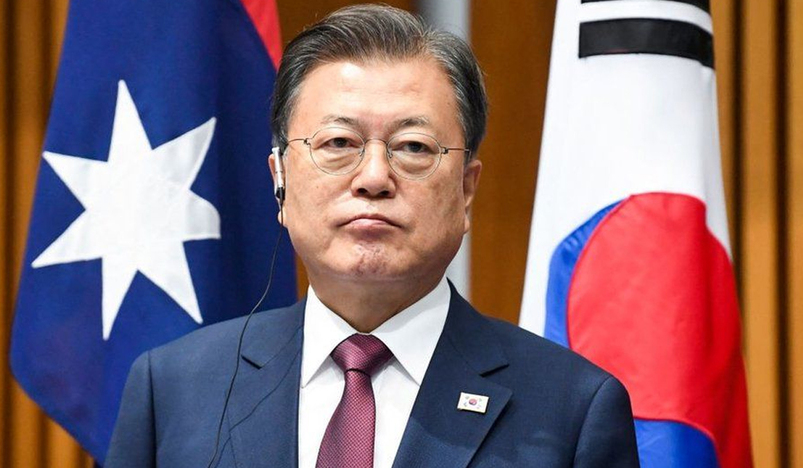
South Korea's president Moon Jae-in has made engagement with the North a cornerstone of his presidency
North and South Korea, the US, and China agree in principle to declare a formal end to the Korean War which ended in an armistice, says the South's President Moon Jae-in.
But talks have yet to begin because of North Korea's demands, he added.
The Korean War lasted from 1950 to 1953.
North and South Korea have technically been at war ever since - backed by China and the US respectively - and locked in a tense relationship.
Having made engagement with the North a cornerstone of his presidency, Mr Moon has long advocated for a formal declaration to the end of the conflict. But observers believe that it would be very difficult to achieve.
Mr Moon, who is currently visiting Australia, was speaking at a joint press conference in Canberra along with Australian Prime Minister Scott Morrison.
In September Kim Yo-jong, the powerful sister of North Korean leader Kim Jong-un, signalled that her country could be open to talks, but only if the US dropped what she called a "hostile policy" against them.
North Korea consistently objects to the presence of US troops in South Korea; the joint military drills held every year between the US and South Korea; as well as US-led sanctions against North Korea's weapons programme.
But the US has repeatedly said that North Korea must first abandon its nuclear weapons before any sanctions can be lifted.
On Monday, Mr Moon said that North Korea was continuing to make this demand as a pre-condition to discussions.
"Because of that, we are not able to sit down for a discussion or negotiation on the declaration... we hope the talks will be initiated," he said.
The South Korean leader has previously argued that a formal declaration to end the war would encourage the North to give up its nuclear weapons.
President Moon is running out of time.
He leaves office in March after five years of heartfelt pleas to bring permanent peace to the Korean peninsula.
And yet North Korea remains more cut off than ever. The days of handshakes and promises between Pyongyang and Seoul appear to be over. For now.
Trying to bring an end of war agreement to the table is Moon Jae-in's last hope.
But he faces significant challenges. The United States appears to be less enthusiastic about the idea. The Biden administration seems happy to talk about it and of course no-one wants a permanent state of war on the peninsula. But some believe an agreement would reward Kim Jong-un without getting any guarantees in return.
Those in favour say the agreement is a diplomatic gesture - a starting point to give North Korea security guarantees. Those who oppose it say Pyongyang could use it to demand the withdrawal of 28,500 US troops from South Korea and bring an end to the annual US-South Korea joint military exercises.
North Korean state media has also described the idea as "premature".
There's a bigger problem for President Moon. South Korea did not sign the armistice. This end-of-war agreement is not his gift to give to the history books.
He can keep trying to bring all parties to the table, but getting them all to agree to the details would be the diplomatic equivalent of climbing Everest.
During a press briefing in October, US National Security Adviser Jake Sullivan said the US "may have somewhat different perspectives on the precise sequence or timing of conditions for different steps" for reaching an agreement on a declaration,
Meanwhile, South Korean news agency Yonhap reported last week that top Chinese diplomat Yang Jiechi had pledged his country's support for "the push for the end-of-war declaration", citing South Korean diplomats in Beijing.
The war began with an incursion across the 38th parallel, the boundary between North and South Korea, by 75,000 troops from the Communist North in June 1950.
American troops supporting the South joined the war in the following months and the North Koreans, supported by China and the USSR, were pushed back.
A bloody stalemate ensued and an armistice was signed between the US and North Korea in July 1953.
Five million troops and civilians lost their lives in the conflict.
Source: BBC
Leave a comment